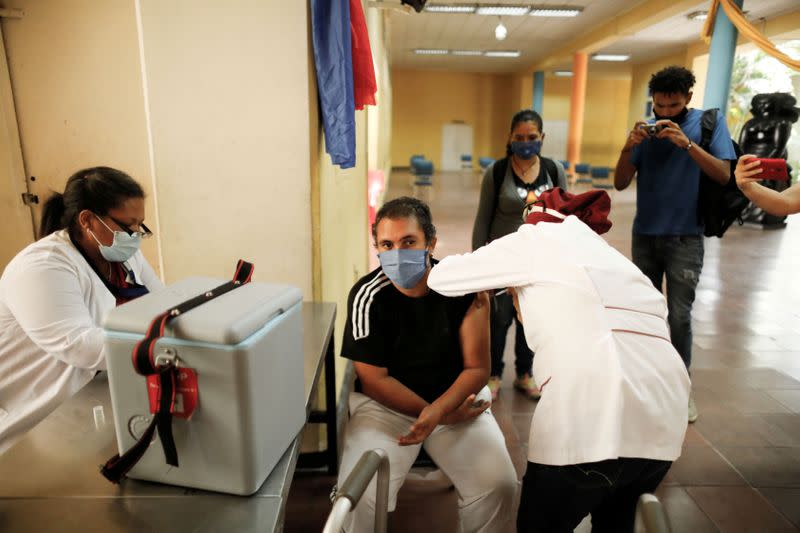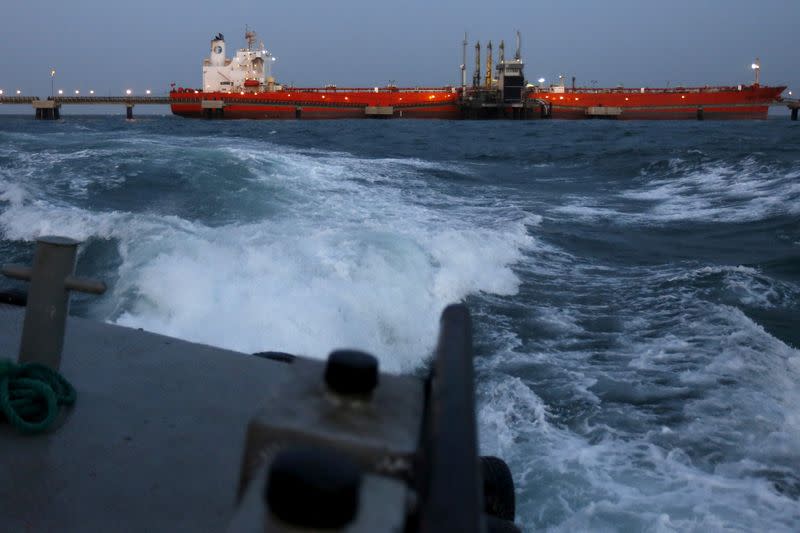Venezuela's Maduro seeks to sideline opponents with 'oil-for-vaccines' plan -analysts, critics
By Luc Cohen
(Reuters) -Venezuelan President Nicolas Maduro's plan to pay for COVID-19 vaccines through oil shipments aims to sideline the country's opposition, which had made strides in securing inoculations, analysts and opposition lawmakers said on Monday.
Maduro proposed on Sunday an "oil-for-vaccines" deal, without providing details on how such a program would work. The crisis-stricken OPEC nation's crude exports have plummeted since the United States slapped sanctions on state oil company Petroleos de Venezuela in January 2019.
Earlier this month, Venezuela's opposition - recognized as the South American country's legitimate government by Washington - said it would seek to use Venezuelan government funds frozen in the United States to pay for vaccines through the World Health Organization's COVAX program, which provides doses to poor countries.
Maduro's government said later it would not approve doses of the AstraZeneca vaccine, the main inoculation used by COVAX in Latin America, citing side effects. Critics argued the move was intended to torpedo the deal to avoid handing the opposition a political victory.
"It is all a little game to cover up the criminal act of impeding the COVAX deal," Luis Stefanelli, an opposition lawmaker on the National Assembly's energy committee, said of the oil-for-vaccines proposal in a telephone interview.
Venezuela's Information Ministry did not immediately respond to a request for comment.
A U.S. State Department representative said the United States hoped the COVAX negotiations would work.
"We took it as a positive sign that all sides agreed to grapple with the challenge," the person said. "They can only do so successfully if all participants engage in these talks in good faith."
Maduro - accused of corruption, human rights violations and rigging his 2018 re-election - remains in power despite the two-year, U.S.-backed campaign to oust him. Some U.S. lawmakers have raised concerns that the sanctions are exacerbating a years-long economic crisis and harming ordinary Venezuelans.
The government blames the sanctions for Venezuela's difficulties paying for humanitarian goods. The country has received fewer than 1 million vaccine doses from allies Russia and China as a second wave of the virus accelerates, threatening to overwhelm its already fragile healthcare system.
A further 50,000 doses of Russia's Sputnik V vaccine arrived in Venezuela on Monday, state television footage showed. Health Minister Carlos Alvarado said authorities would use the doses to inoculate more healthcare workers and elderly people.
Vice President Delcy Rodriguez said later that Venezuela would also use EpiVacCorona, Russia's second registered vaccine, without offering details on when or how many doses would arrive.
'PLAYING THE VICTIM'
To facilitate vaccine access, the opposition and business groups have developed alternatives designed to avoid having the government pay directly for the shots. While the U.S. sanctions exempt humanitarian goods, banks are often reluctant to handle transactions linked to Venezuela's government.
Opposition leaders argue that sanctions prevent Maduro's government from "looting" the country's natural resources.
"He wants to raise the costs for those who are against his ability to export," Antero Alvarado, Venezuela director at energy consultancy Gas Energy Latin America, said of Maduro's oil-for-vaccines plan. "He is obviously playing the victim."
Some opposition politicians and economists have in the past proposed an "oil-for-food" scheme to lessen the humanitarian impact of the sanctions while avoiding the corruption that plagued a similar program administered by the United Nations for Iraq when it was under U.N. sanctions two decades ago.
Francisco Rodriguez, a Venezuelan economist who has advocated for such an arrangement, said Maduro's proposal was unlikely to prosper without the opposition's involvement.
Juan Guaido, who was speaker of the opposition-held National Assembly when Maduro was inaugurated for a second term in 2019, remains recognized as Venezuela's legitimate head of state by the United States and many Latin American countries.
"It is a misguided attempt because the solution to this problem requires negotiations with Guaido," Rodriguez said.
(Reporting by Luc Cohen in New York; Additional reporting by Daphne Psaledakis in Washington and Vivian Sequera in Caracas; Editing by Lisa Shumaker and Peter Cooney)




